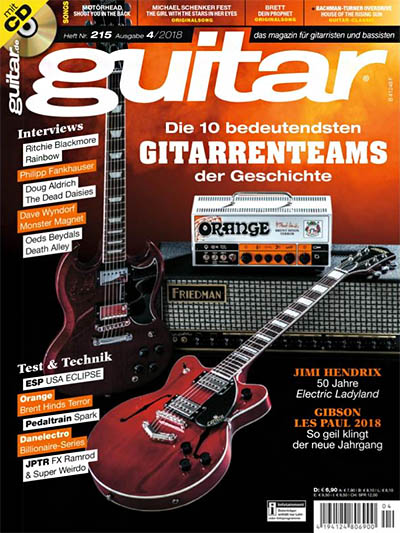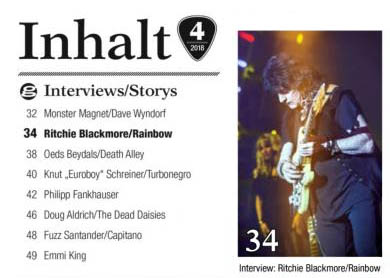|
Ritchie Blackmore German Guitar Magazine - Issue 4/2018  Ritchie, with this Rainbow-reunion you probably satisfy the nostalgic feelings of your fans. How did you feel about this reunion personally?
Ritchie, with this Rainbow-reunion you probably satisfy the nostalgic feelings of your fans. How did you feel about this reunion personally?Ritchie: I was happy to play many of those again after such a long time. But it was a challenge to remember all the arrangements, which I hadn't played in more than 20 years. You really have to use your brain on stage, because we don't play a lot together as a band. You've released a song called "Land of Hope and Glory". Where does that melody come from? Ritchie: "Land of Hope and Glory" always was the opening track for Rainbow shows. It was played right before we entered the stage. So I thought it would be a clever idea to play this song on the electric guitar. The original is from british composer Edward Elgar and is called "Pomp & Circumstance". Is playing all the old songs inspiring you to write new heavy riffs? Ritchie: When I'm playing rock music, I'm basically just wearing another hat. You don't play certain things in a rock context. I have to play in a different style on the guitar, which is a challenge for me. The biggest task for me was to change from fingerstyle to using a plectrum again. With Blackmore's Night I'm playing nearly everything without a plectrum. What do you think about the current nostalgic wave for old rock bands? Do you think classic rock music won't be fashionable anymore in the future? Ritchie: Sometimes I think that rock music had reached it's peak in 1975, but at the same time there's always new bands that surprise me. Some of the old bands are still impressing me, too. For example Queen, when they collaborated with Paul Rodgers. I really loved what they did together. Which of your strats are you using for the current Rainbow shows? Is it the same one that you used on the Rainbow tour in the 90ies with Doogie White? Ritchie: Yes, it is. The special thing about it is that it has very high frets. I really like that. Of course the fretboard is scalloped and I have changed the pickups. But don't ask me which ones I currently have. Also it was the only strat in my garage, which was lacquered white. In the old days I used the tremolo bar a lot. I had a custom product, which was about a centimetre thick, so I could do extreme bendings with it. But meanwhile so many guitar players are using a floyd rose. I stopped using it decades ago. I like to be different than everyone else. Technically it just curses problems anyway, when a string cracks for example. Did you use your ENGL signature amp at the shows? Ritchie: I play through an ENGL, but it wasn't my signature amp. It would have been too loud. It was a 50-watt-combo. Personally I prefer smaller amps, because I can control the sound a lot better than with the big Marshall amps, which I've used in the old days. In the very beginning I used a VOX with 30 watt. And that was already very loud. A lot of your solos in the live shows in the last 2 years sounded very melodic. They didn't have the speed and weren't as powerful as in the old days. Does speed and making a lot of noise still interest you? Ritchie: Just making noise was never my thing. I already hear enough of that when I'm visiting a pub near my home on the weekend. A solo always should be a further development of a song. Today I like to play melodic solos with enough substance to enrich the song and keep it exciting. Speed used to excite me in the early years of my career. Today I prefer to hear a well-thought-out and elaborated guitar solo. When I think of that Jimi Hendrix "All Along the Watchtower" comes to my head. It's starting with the basic melody, goes over into a Wah-Wah-pedal thing and ends with a rythmic accord sequence. A lot of guitar players would have probably played a thousand notes over this solo section, but Hendrix really thought about what he played. That's what I prefer today.  In some songs, you're using a bottle neck, although you use it a little bit different than most other guitar players...
In some songs, you're using a bottle neck, although you use it a little bit different than most other guitar players...Ritchie: I'm holding it in my hand. It gives me a much better control of the vibrato. Pedal-steel-players are doing it in a similar way. I don't like to put it onto one of my fingers. Are you planning to record some more new Rainbow songs in the future? Maybe there's even song ideas around, which weren't suitable for Blackmore's Night? Ritchie: Sometimes I think about that. Also your idea with the ideas for Blackmore's Night was something I already thought about. Actually I'm thinking about writing some new heavy rock songs with Candice, like we already did in 1995. I'm still writing hard rock songs, but it's complicated for me, when I'm just strumming along on the acoustic. So for that I want to get together with the band in the studio and turn up the amplifiers. At home it's usually just me and the acoustic guitar. What are the plans for Rainbow after the 2018 live shows? Ritchie: At first we're playing Helsinki, Moscow, St. Petersburg, Berlin and Prague. I don't like to book too many shows in advance. I like to do that spontaniously. Could you imagine to play some rock songs from Blackmore's Night with Rainbow? Ritchie: There are definetely some songs that would fit in very well. Are you keeping up with the current rock music scene? Ritchie: I don't listen to a lot of rock music, except for when I'm sitting in a bar, where it gets played. Guitar players like Brad Paisley, Vince Gill or George Benson impress me. But to be honest, these days I'm more into listening to Renaissance music and that's a whole different type of music to play. I find instruments like a hurdy gurdy, bagpipes or woodwind instruments currently more fascinating than the guitar. I'm really enthusiastic about the organic sound they can produce. Have you ever played guitars with seven or even eight strings? Ritchie: No. I'm playing mandolas with eight strings. Not too long ago someone gave me a guitar with 7 strings and I haven't even played one note on it yet. I will probably donate it, because I'm really not interested in these kind of things. In the 80ies you've had problems with the short haircut of Graham Bonnet. What about Ronnie Romero? Ritchie: Almost everyone had long hair in the 70ies. At heart I'm still an old hippie. © Guitar Magazine #215 (Germany) - Issue 4/2018 |